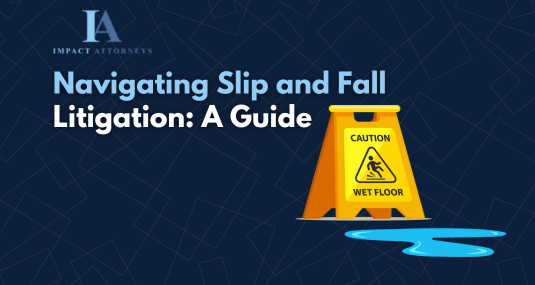Car accidents can be overwhelming and stressful. If you’re wondering, in a car accident what do I do?, knowing the right steps to take immediately is crucial for your safety and legal protection.
At Impact Attorneys, we’ve helped countless clients navigate the complexities of car accident cases. This guide will walk you through the essential steps to take if you’re in a car accident, ensuring you’re prepared for any situation on the road.
What to Do Right After a Car Crash
Prioritize Safety and Health
The moments following a car accident are critical. Your actions can significantly impact your safety, health, and potential legal claims. Check yourself and your passengers for injuries. If possible and safe, move vehicles to the shoulder or away from traffic. Turn on hazard lights to alert other drivers.
Contact Emergency Services
Call 911 immediately, even for minor accidents. Police reports are valuable for insurance claims and potential lawsuits. By having a police report, it is easier to show what took place during the crash, making the insurance process smoother. When you speak with the dispatcher, provide clear information about your location and any injuries. Stay on the line until they tell you to hang up.
Exchange Information Carefully
Once you ensure everyone’s safety, exchange information with the other driver. Obtain their name, phone number, insurance details, and license plate number. Be polite but avoid discussing fault or apologizing, as this could be used against you later (this is a common mistake many people make).
Document Everything
Use your smartphone to take photos of the accident scene, including all vehicles involved, license plates, and any visible injuries. Ask witnesses for their contact information. Their statements could prove crucial for your case.
Seek Medical Attention
Even if you feel fine, visit a doctor as soon as possible after the accident. Some injuries (like whiplash or internal bleeding) may not show symptoms immediately. A medical professional can properly assess your condition and provide documentation that may be important for your case.
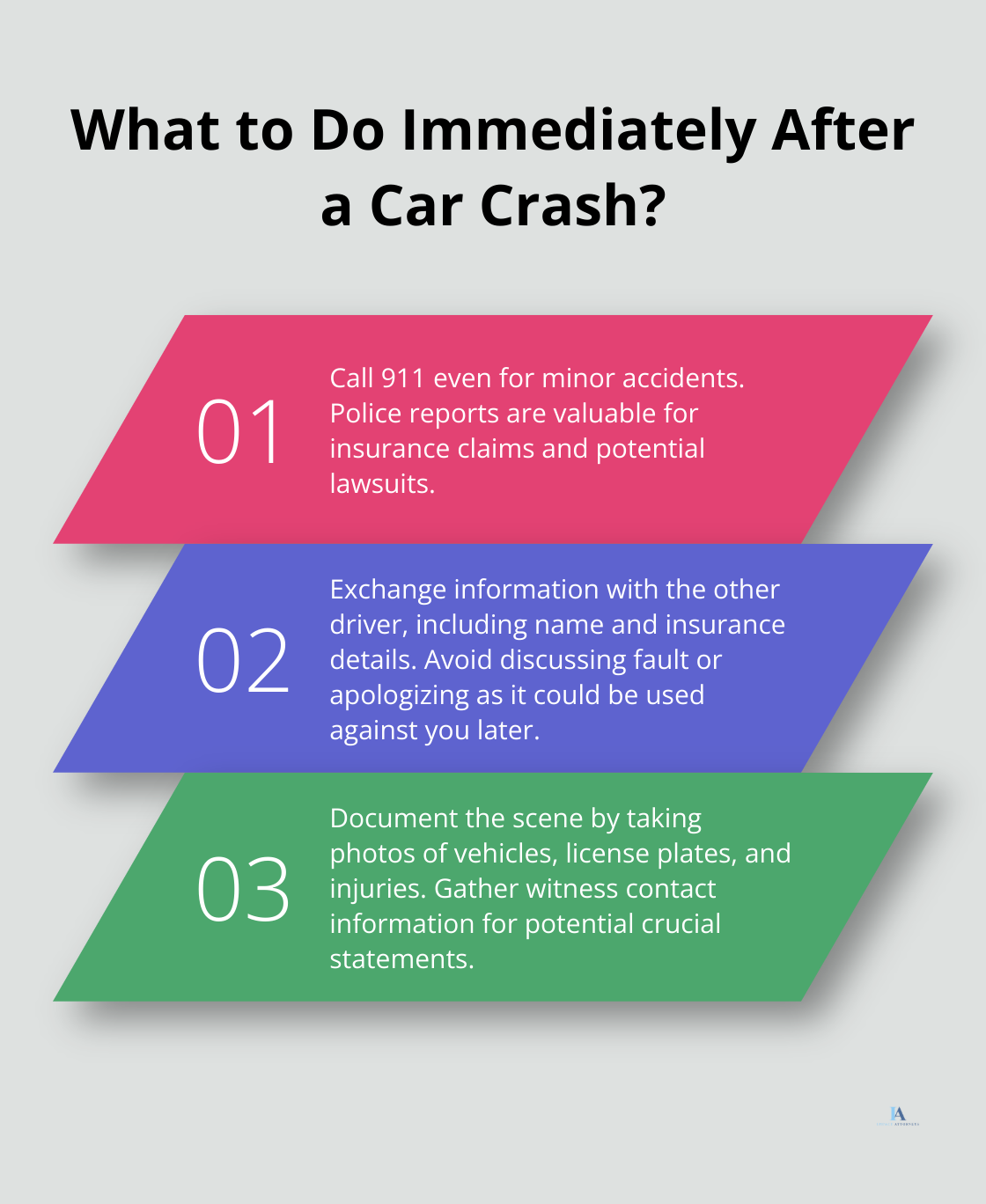
Thorough documentation can make or break a case. Gather as much evidence as possible at the scene. This information is invaluable when building a strong claim for compensation.
Your actions immediately after an accident can have long-lasting effects on your health and legal rights. These steps will prepare you to handle the aftermath of a car crash and protect your interests. As we move forward, let’s explore the next crucial phase: gathering evidence and information to support your case.
Building Your Case After a Car Accident
Secure the Police Report
Always obtain a copy of the police report. This document provides an official account of the accident and often includes the officer’s assessment of fault. NHTSA’s National Center for Statistics and Analysis has been responsible for providing a wide range of analytical and statistical support to highway safety. Request the report from the responding police department or your insurance company.
Document Witness Accounts
Witness statements can change the outcome of disputed cases. Contact witnesses as soon as possible while their memories are fresh. Ask for detailed accounts and record them if possible. The Insurance Information Institute states that witness statements can increase claim success rates by up to 30%.
Create a Comprehensive Accident File
Start a dedicated file for all accident-related documents. Include photos of the accident scene, vehicle damage, and injuries. Add medical records, repair estimates, and any correspondence with insurance companies. This organized approach can speed up the claims process and strengthen your case.
Preserve Physical Evidence
Don’t discard or repair damaged items without proper documentation. Torn clothing, deployed airbags, and even damaged personal belongings can serve as powerful evidence. Photograph these items and keep them in a safe place. If you need to repair your vehicle, inform your insurance company first and document all repairs.
Track Medical Treatment and Expenses
Keep a detailed log of all medical treatments, including dates, providers, and costs. Save all bills, prescriptions, and receipts. If your injuries are more severe, you will most likely have higher medical expenses, lost wages, and pain and suffering.
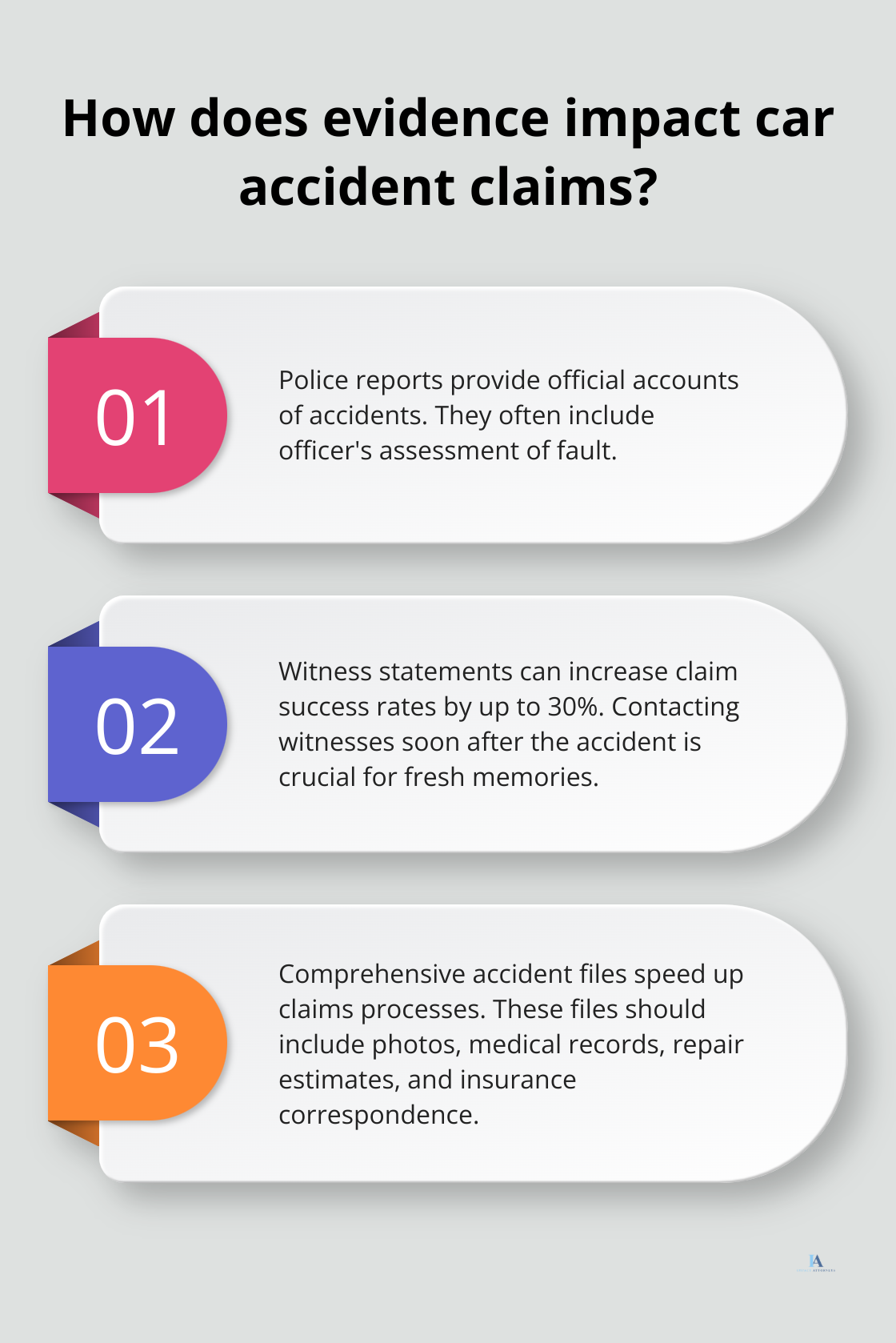
Thorough evidence gathering can significantly impact the outcome of your case. The strength of your claim often lies in the details you collect in these early stages. As you move forward with your case, the next step involves navigating the complex world of insurance companies and potential legal proceedings.
If you’re involved in an accident at a dangerous intersection, remember to seek medical attention, gather evidence, file a police report, and contact a legal professional for guidance.
Navigating Insurance After an Accident
Notify Your Insurer Promptly
Contact your insurance company immediately after the accident. Most policies demand quick notification and full cooperation. A delay might risk your coverage. With straight-through processing, financial companies can speed up the time it takes them to process a claim by eliminating the need for manual intervention.
Understand Your Policy
Review your policy thoroughly. Know your coverage limits, deductibles, and specific benefits. Many policies include unexpected perks (such as rental car coverage or medical payment benefits). Ask your insurance agent to explain any unclear aspects.
Exercise Caution with Other Insurers
Be careful when talking to the other party’s insurance company. They aim to minimize their payout. Stick to facts and avoid speculating about fault or injury extent. Insurance adjusters often use tactics to extract harmful statements. Direct them to your attorney if you’re unsure.
Seek Professional Advice Before Settlement
Insurance companies often push for quick settlements. However, early acceptance can shortchange you, especially if your injuries’ full extent remains unknown. Consult a personal injury attorney before accepting any offer to ensure fairness and comprehensive coverage.
Keep Detailed Records
Maintain a log of all insurance company communications. Note the date, time, and content of each call or email. This documentation proves invaluable in future disputes. Use a dedicated notebook or digital file for easy organization and access. If you’re involved in an accident, it’s crucial to gather evidence and file a police report to support your insurance claim.
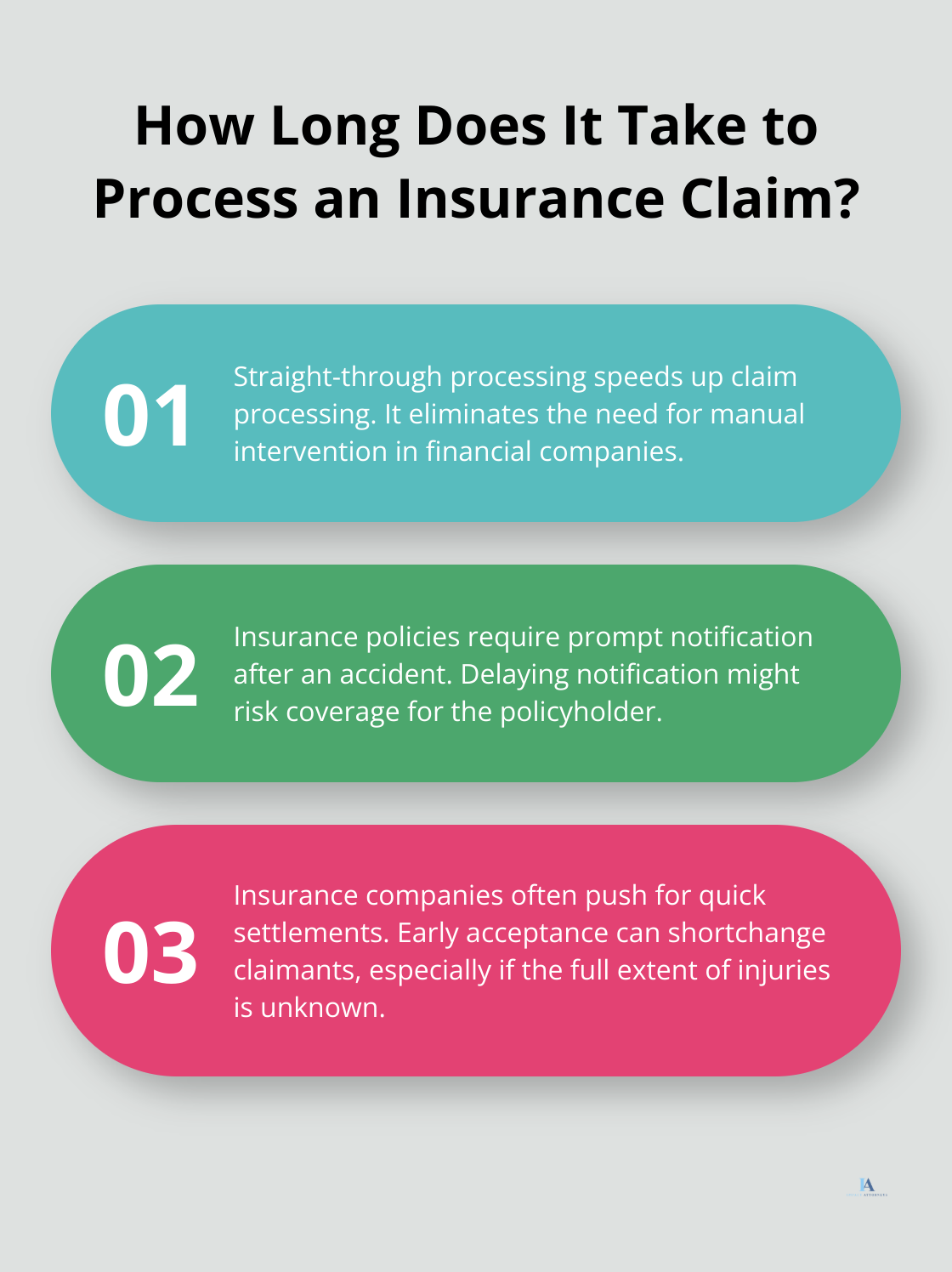
Final Thoughts
Car accidents can shake you to your core. You must prioritize safety, seek medical attention, and document everything. Report the incident to authorities and your insurance company. These actions will protect your health and legal rights. Insurance companies often put their interests first. You should approach settlements and communications carefully. Detailed records and policy understanding will help you avoid claim pitfalls.
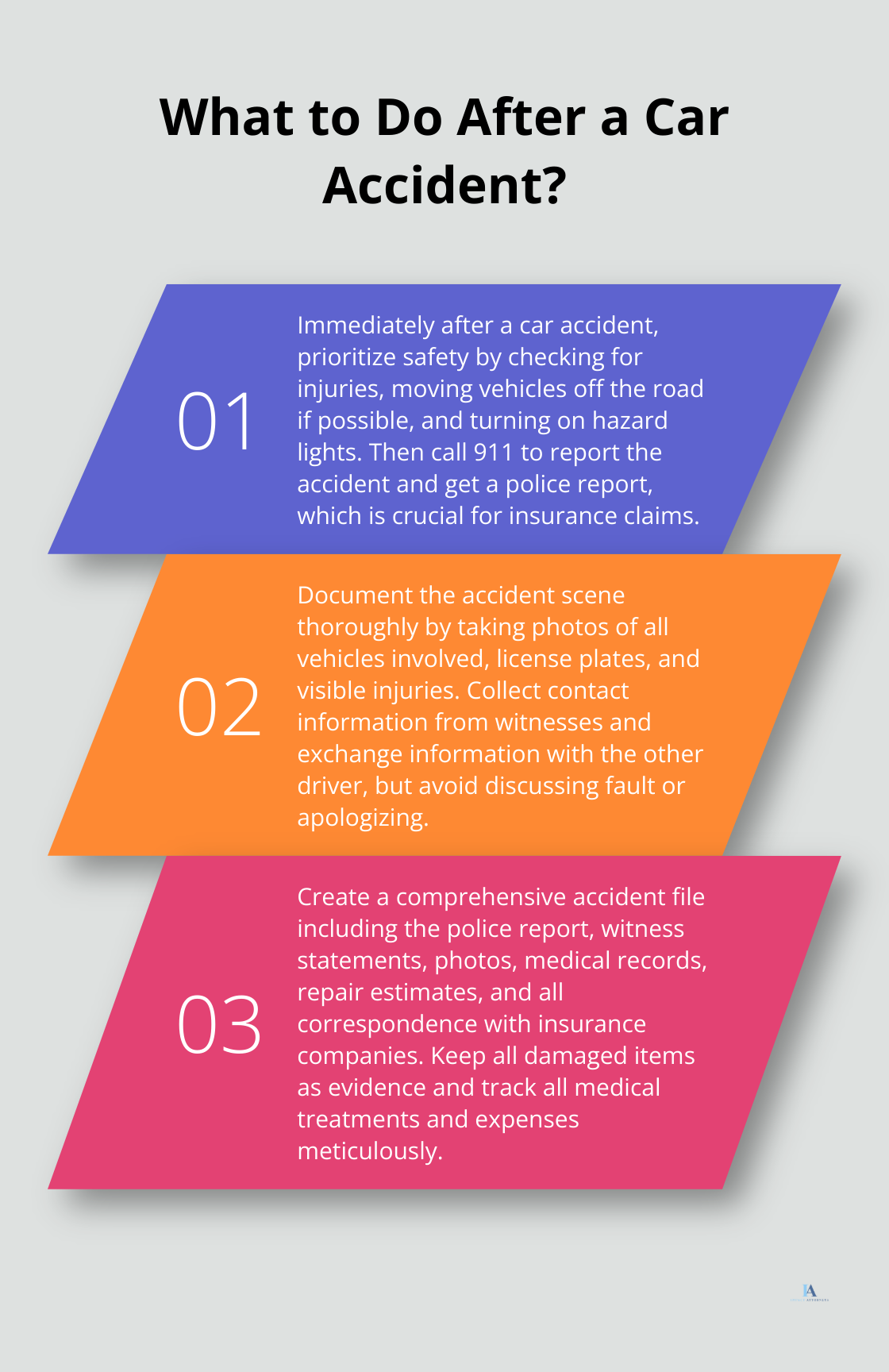
Professional legal assistance can transform your case outcome. Impact Attorneys specializes in personal injury cases, including car accidents. Our team handles all aspects of your claim. We work on a contingency fee basis. You pay no legal fees unless we win your case.
If you ask “In a car accident, what do I do?”, the answer is clear. Take immediate action to protect yourself. Document everything thoroughly. Seek professional help to navigate the complex aftermath. Our experienced attorneys will fight for your rights and maximize your compensation.

